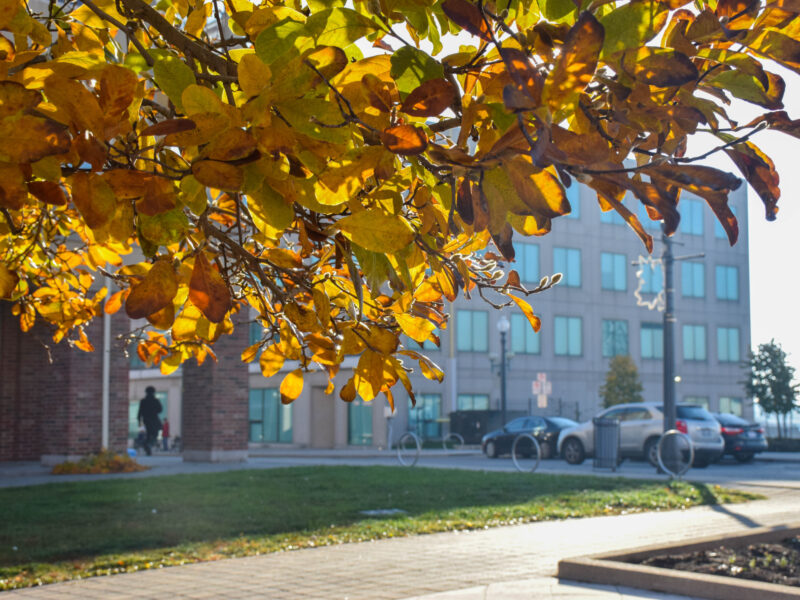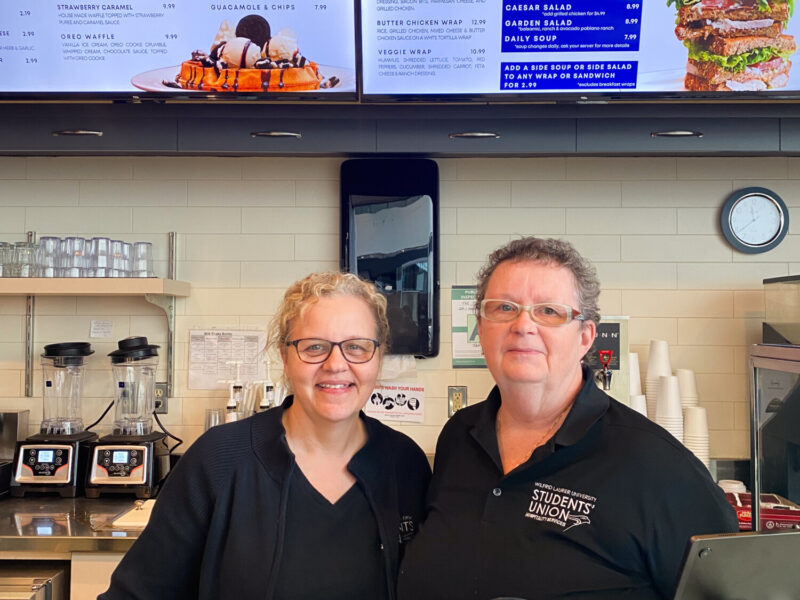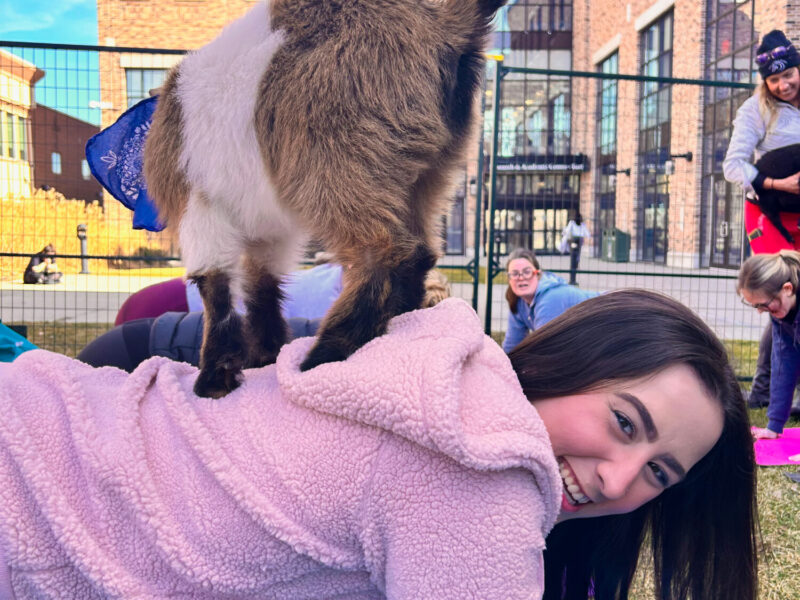I affirm my oath of secrecy at 2:45 p.m.
After a short wait in the office of the media relations officer, where I receive a vest and a jacket, he leads me through a maze of hallways to meet the officer with whom I’ll be riding shotgun until 2:00 a.m. I’m nervous. He places me into Interview Room #2 and goes to find my officer. Sitting in the bland white room, consisting of me, a small circular table, two chairs and a piece of chewed gum on the floor, I tap my foot in anticipation.
I hear the clicking of footsteps from the hall and, the media officer returns with a man who looks like he could pick me up and squish me with one hand. I am introduced to Sergeant Brad Cotton who, after the “how ya doin’s,” places his hands on his belt and falls quiet. Now, for the first time since considering doing a ride-along with the Brantford Police, I am struck by a thought: What the hell am I going to talk to this man about for ten hours? Oh god, what did I get myself into?
Stepping out of Interview Room #2, I follow Cotton to another room down the hall and when we arrive, it’s filled with black uniformed officers. He heads to the front, leaving me to lean awkwardly at the back, clutching my clipboard to my side for support. The meeting, or “parade,” as the officers call it, begins and the shift is updated on the criminal happenings of the morning, and each officer is given their assignments. As everyone gets up to leave, Cotton beckons me to the front. I zig-zag through bodies and when I get there, he gives me a radio; it’s in case we get separated. He explains how to turn it on by pressing the orange button on the top.
“Don’t press it unless it’s an emergency,” he says. I nod.
In his office, Cotton gives me a quick PowerPoint lesson on “Cover and Concealment.”
Concealment will hide you, but won’t stop a bullet; cover is anything that will stop you from getting shot. I am surprised to see that a curb is included on the latter list. As a last resort, I would hope.
We start to leave, and I notice him take a glance at my shoes. Converse All-Stars. Entering the lounge, he asks what size shoe I am – size ten – and then disappears back out the door. He returns with a pair of boots – size ten.
“These will at least keep your feet warm and dry,” he says. I glance down at my trusty Converse and, after a brief debate with myself, I decide he is probably right, so I lace them up.
Stepping outside, he stops me before I set foot inside the car. Opening the back door, he pulls a few anti-bacterial wipes from a container and begins to wipe down my side of the car, then continues onto his side.
Well, there’s something you don’t see on reality T.V., I think to myself.
Settling into the passenger side, I wait as Cotton logs in to the computer resting between the seats, then after a quick stop at his truck, where he grabs a backpack and a toque for me, making me feel that much more unprepared, we hit the streets.
Once we get on the road, it’s Cotton who breaks the ice, as he volunteers to tell me a little about himself. He has 20 years with the Brantford Police under his belt, which includes stints as a Crime Prevention Officer and a School Traffic Safety officer, as well as nine years as a patrol officer and two years teaching Firearms at the Ontario Police College. He is married with two children.
We continue to talk our way through the first couple hours of his shift. We are interrupted once so Cotton can issue a ticket to a car for going through a red light: $180.
“Ouch,” I say when Cotton returns to the car. “I bet he was happy.”
“Well, he said thank you,” Cotton replies. “Better than anything else he could have said.”
I ask whether he ever gets nervous on the job.
“Absolutely,” he says. “You never know what you’re going to come across.” He tells me that no call is routine; he can receive calls that sound like they’re going to be easy and turn out to be terrible, and calls that look terrible that turn out to be nothing. However, Cotton feels this lack of routine isn’t always a bad thing.
“It’s these elements of uncertainty that make it interesting.”
Soon after, we pull into a Tim Hortons’ to grab coffees, and I am now only focused on one question: Is he going to order a donut? Stereotypical, I know, but I think Cotton was conscious of it, too.
He orders a tea and I get a coffee; him two peanut butter cookies, me a chocolate dip donut. He pays and I graciously thank.
“No donut?” I joke.
“You can put that in your article,” he says with a laugh.
“Are you just not buying a donut to avoid the stereotype?” I ask him.
“Something like that,” he laughs.
We head back out and after issuing another car a warning for running a red, we turn onto Dalhousie St. It’s now Cotton’s turn to ask me a question.
“What do you see?”
I look around, confused for a few seconds. Is he expecting some brilliant answer here? Or just the obvious? Okay, well, I see buildings, streetlights, pedestrians, Harmony Square, yada yada yada. He turns around the block and I turn the question around on him.
“Opportunity,” he says, and here was my first lesson in what is called “Crime Prevention Through Environmental Design,” or CPTED – basically, using construction and architectural techniques in a certain way to help prevent crime.
We pull in front of BRAC, and Cotton points out a few such techniques. The windowsills are made smaller to prevent people from sitting on them and loitering out front of the building.
The sidewalks are angled toward the street which prevents people from standing there for long periods of time, as well the canopies above the windows are small, once again to prevent people from congregating beneath them. While this is CPTED on a much smaller scale, it still allowed me to notice that those mundane things I see everyday actually have a purpose.
Around 11 p.m., we do a walk through of Club NV, and at midnight we do the same thing at Jackhammers. It is around this point that I realize the kind of community that exists between these officers. Through the computers in their cruisers, the officers have their own personal messaging system similar to a primitive MSN Messenger, through which they can send messages from car to car.
Before going into Club NV, Cotton messages another cruiser to join, and at Jackhammers, he orders another two. I notice that it is rare to see only one police cruiser when a car is pulled over. If one officer is involved with something and another is in the area, they will head straight there if they’re unoccupied.
“We just want to make sure everyone gets home at the end of the night,” Cotton says.
Near the end of the night, we are sitting in the Sears parking lot with one other officer, across the street from Jackhammers. In the darkness, I am jotting my notes by a small LED lamp attached to the back of the computer. A small blip appears on Cotton’s screen; it’s another officer, joking around with Cotton.
Later I think about all the things that police officers do that no one ever sees: the CPTED; the car to car messages. I ask Cotton if there is any part of his job that bothers him when he’s at home.
“After covering a break-in or a domestic dispute, I always go home and hug my wife and I hug my kids,” he says, “because I can’t imagine how terrible it would be to go through something like that.”
I’m not quite sure what to say, not sure I want to ask for details into the things he’s seen – for his sake and my own.
“Being a police officer has caused me to appreciate more and more what I’ve got.”
It is close to the end of our shift when I mention to Cotton that this story will be in our themed edition of The Sputnik, the “Invisible Issue,” and I ask him how the word “invisible” applies to his job. He pauses for a moment before answering, turning the question over in his head a few times.
“I think the public has a very ‘Hollywood’ idea of what we do.” Another pause.
“The people who want to hurt your family, or steal your things, or damage your property, they’re not always blatant and in your face about it.”
Invisible.
The last job of the night is gassing up the cruiser, which is done inside a compound past an automatic metal gate. Waiting inside as Cotton fills up the car and chats with a fellow officer, I finish my notes, rewriting certain things I scribbled down in a hurry.
When he’s finished, Cotton gets back in and swings the car around to face the gate, which is comprised of thick metal poles tipped with sharp points. Waiting for the gate to slide open, Cotton jokes around.
“Do you think that gate would keep zombies out?” he asks.
“Well,” I say with a laugh, “it depends what type of zombies we’re talking about here. 28 Days Later zombies or Dawn of the Dead zombies.”
“I didn’t realize there was a difference?” Of course there’s a difference!
This sparked a 15-minute conversation about zombies that only ended when we pulled into the parking lot back at the Police Station.
It is after this conversation that something Cotton told me earlier in the shift replays in my head. I realize that it not only perfectly captures the job of a Brantford Police officer but that it could easily summarize my ten hours in the passenger seat of his car:
“You never know what you’re going to come across.”



